1.Introduction
Wong Kar-wai is a director with great personality. His style is not only reflected in the image characteristics, but also in symbolizing the characters in the image. In Wong Kar-wai’s films, women are often outside social norms, and some of their roles are even controversial. Women in Chinese society, as well as those in other East Asian countries, had no formal role outside the family in the past and were still influenced by conservative gender ideology. In the past, it was often idealized as a perfect female image, which contained the suppression of female self. However, these "indecent" female images constructed in Wong Kar-wai's films either go out of their essential roles or become sexual beings. Compared with the idealized female image, the "indecent" female image subverts the male-dominated gender discourse, shows a strong feminist color, and reveals the awakening of women's self-consciousness and their living conditions. Therefore, it is worth studying how to create "indecent" female images in movies.
Based on the feminist perspective, this paper discusses the construction of these "indecent" female images. In the movies "2046" and "The hand", many female characters went on the stage, such as helpless lover, rebellious daughter and heavy ideal lover, which cross and interact with each other. The young and beautiful hussy Bai Ling, the enchanting and mysterious professional gambler "Black Spider", the gentle and rebellious Wang Jingwen, the proud and elegant socialite Miss Hua, and Su Lizhen bounded by tradition. Among them, female images such as prostitutes, socialites and professional gamblers are the key figures that make up "indecent" women. The two films take women as the main scenery in the films, showing the tragic fate of women under various roles, and strengthening women's subordinate status of gender.
From the perspective of Foucault's theory of power and Beauvoir’s theory of the other in The Second Sex, this paper analyzes the construction of characters in the movie text. The word "the other" is an important concept in the self-reflection of western philosophy. It appeared earlier in Simone De Beauvoir, author of the book "The Second Sex" published in 1949. Beauvoir believed that "women are not born, but the result of social and cultural construction." [1]. At the same time, Foucault's theory played an undoubted role in the development of feminism, especially his power thoughts. Foucault believed that "power controls the body, and the body is constantly fighting against power."[2]. In short, the research horizon provided by the concept of "the other" broadens the perspective of feminist film theory, while the power theory shows the thinking process of feminist film theory from revealing the female image to cultural subversion. This article discusses the indecent images of women from three aspects: women's self-awakening, confrontation and subversion, and the inevitable fate of being unable to escape.
2.Literature review
Beauvoir's theory is closely related to the contemporary society, especially her concern about women's situation and oppression. Beauvoir raises an important question in her book The Second Sex (1949-2012): "what is a woman?” and shows that women are different in their relationship with men. Simone de Beauvoir believes that men are regarded as subjects and women as objects. Men stand for standards and women stand for "the other"[3]. Beauvoir argues that the male view sees women as feeble, shallow, passive, and docile. She believes that this view is not based on biology or nature, but rather on social creation, a concept of social construction. It denies women's autonomy and authority and associates women's identity with men: "a person is not born a woman, but becomes a woman" [3]. From this perspective, Beauvoir’s theory is a useful source and inspiration. Therefore, it is related to our research. There is a very profound connection between movies and gender. Wong Kar-wai is a male director who can best sense the characteristics of postmodern media. However, the female images behind his modern images mostly exist as an image that has been ignored and lost its subject, waiting for the salvation and reward of men. The movies "2046" and "The hand" are shot from a male perspective. The audience in the cinema naturally identifies with the perspective of male characters. Therefore, there are three levels of viewing: the viewer's viewing, the camera's recording, and the characters on the screen. Through the inner world and the extended outer space, the movie embodies and presents the female role.
In addition, Claire Johnston analyzes the women and their desires in these films from a theoretical perspective and tries to find a fractured and ravine side in the films, so as to prove that the oppressed women are eager to break out and break the existing patriarchal mechanism. Johnston is one of the first feminist critics to criticize the female stereotypes in movies with semiotic approach. She interprets the symbol "woman" as a construction, a symbol, or a convention. She represents the conscious meaning of "woman" in men's hearts. However, as far as women are concerned, they are nothing: women only mean "not men" passively, and "women as women themselves" are never shown in the movie text. The previous theory regards the movie as a reflection of reality, while Johnston proposed that the movie itself is a special and conscious reality, which is a significant change in the movie theory. Johnston's theory uses psychoanalysis as a means of criticism, in which she is very similar to Beauvoir’s theory.
Foucault and feminism are the topics that the western academic circles pay close attention to. Foucault’s power thought is influenced by Nietzsche's "theory of will to power" and has played an undoubted role in the development of postmodern feminism. Especially, his power thought provides valuable methodology for feminist analysis.
First of all, discourses make particular realities, subjectivities and experiences possible for people to take up or have imposed on them [4]. Male discourse dominates the whole society and overemphasizes the behavior characteristics of women, which makes women fall into a world of self-control and cannot consciously. "Women with devilish bodies and incredible attractiveness are more likely to express male desires than female desires." However, these norms are not imposed on women in the form of imposition but are achieved through the internalization of power. The gender identity in Wong Kar-wai’s films reflects that men are always the main body of actions. He can run away from and refuse to take charge of his own destiny, but women can only depend on men to exist. Even resistance can only be an apparent helplessness to revenge men and torture himself in substance.
Secondly, Foucault believes that there is a relationship between power and knowledge, and each relationship leads to the construction of another relationship. In The history of sexuality: Vol. I, Foucault writes: “There is no power relation without the correlative constitution of a field of knowledge, nor any knowledge that does not presuppose and constitute at the same time, power relations” [5]. In other words, no individual or group can exert power over another individual or group without a knowledge domain that supports this power relationship, and no knowledge is constructed when one obtains power although this process is not always intentional. Foucault conceptualized a knowledge-power nexus (pouvoir-savoir), meaning that the ways in which we are able to make sense of something dis-cursively and influence how we are able to act. For example, in the movie "2046", Wang Jingwen (Angel), the rebellious daughter, finally has to compromise with her father, who represents the mastery of knowledge and power.
Finally, this concept of power and appropriate resistance inevitably involves sexual issues. Foucault's exposition in the history of sex shows us how sex has increasingly become an important place of power in the contemporary western society, and how to fight for control of sex through increasing and diversified exposition. In M. Keith Booker's words, "for Foucault, sex is not so much a matter of natural institutional influences as of socially and discretely conditioned responses". Foucault thinks that sex is a profound political problem. In the symbolic order and power structure of society [6], lust and sex have always been the focus of attention. In the form of sexual expression, the male-dominated tradition of contempt and control over women is unconsciously penetrated or integrated. As the scholar Mary Antoine pointed out in her book "Women's Movies: Possession and Courtship”, in traditional movies, one or more female characters are usually designed to provide lust for male characters and male audiences and are realized by relying on physical sex. The heroine in Wong Kar-wai’s films is often just like this role portrayed formally.
To sum up, this paper uses Beauvoir’s "the other" and Foucault's power theory to analyze the construction of indecent female images in Wong Kar-wai’s films. This article will analyze the indecent women's roles in the two films from three parts: awakening, confrontation and fate. It also discusses how discourse forms or power structures establish objective standards for women.
3.Self and awakening
3.1.Discourse in Aphasia
Foucault once said that "words are power." Fathers are often portrayed as the head of the family. If their daughters disappoint them or misbehave, they use language or physical strength. In 2046, boss Wang acts as a father, who represents men in power. When Wang Jingwen's love affair with her Japanese boyfriend was suppressed by her father, she had no language. After completing such confrontational behaviors as running away from home, she could only rely on her father's incomprehensible Japanese to repeat and insist: "I will go with you." To express one's deep attachment. The silent behavior deduces the fate of the female subject and expresses the situation that the female lacks the right to speak. In both discipline and punish, Birth of the Prison (1975) and the History of Sex: Volume 1: An Introduction (1976), Foucault made an influential exposition of the interrelation between power, discourse and subject. Foucault suggests that discourses structure our sense of reality, and our thoughts and actions are influenced. However, in "history of sex", Foucault argues that discourse is both the "means of resistance" [7]. Wang Jingwen's soliloquy can be regarded as the reference and metaphor of modern women's survival dilemma and reveals women's awakening to self-consciousness from a subtle point.
3.2.Independent Others
Women's discourse space is limited, and they face the fate of being restricted by the society. So where is the outlet for women? Wang Jingwen and "Black Spider" Su Lizhen (Gong Li) both realize the importance of economic independence. Gambler Black Spider can help Zhou Muyun win back her capital. She will never give up her love which is regarded as body double’s.
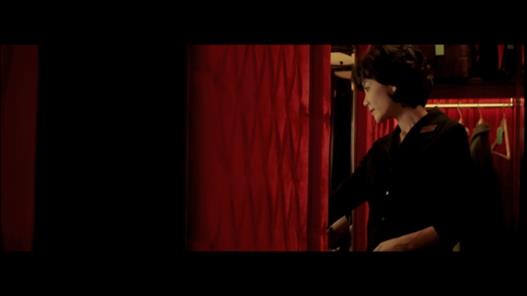
Figure 1: The cloakroom is a semi-open space. The camera peeks from the back of the cloakroom to see Wang Jingwen working alone without telling her father to earn her own living
The inner world of the female masters is rich. They are no longer dependent on men, and they are financially independent. However, this is the ideal lover that men seek to meet the aesthetic standard of male objects, and women will inevitably become a real "other". According to Beauvoir, women’s invisibility throughout history is a result of living in a patriarchy. Women want to free themselves from paternalism but are “kept in place” by men.
3.3.Awakening of cheongsam
In addition, the way women dress reveals their awakening from another aspect. In Wong Kar-wai’s films, the cheongsam connects Hong Kong and Shanghai, concentrating "the opposing forces of tradition and modernity". In Wong Kar-wai’s writing about gender memory, the female body depicted by the cheongsam plays a crucial role.
Maggie Cheung once said in an interview: "I feel the limitation of wearing cheongsam, because the clothes are so tight that I can't move, feel why they put themselves away and dare not express it." [8] The cheongsam wrapped in the body is no longer purely for the purpose of covering up shame and embellishment, but also deduces a kind of moral standard of eastern culture. Therefore, the cheongsam that clings to Maggie Cheung in the Mood for Love is just like a ruler. Even if you stay with Tony Leung Chiu Wai in a narrow room for a long night, the cheongsam is smooth and ironed (as shown in Figure 2.3). The meaning of "standard" is obvious.
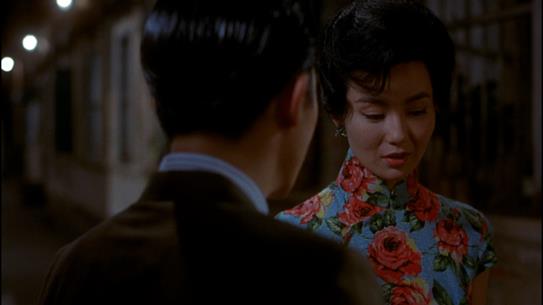
Figure 2: Her hairstyle has almost never changed, always combed bright and in order on the top of the head, without any slack
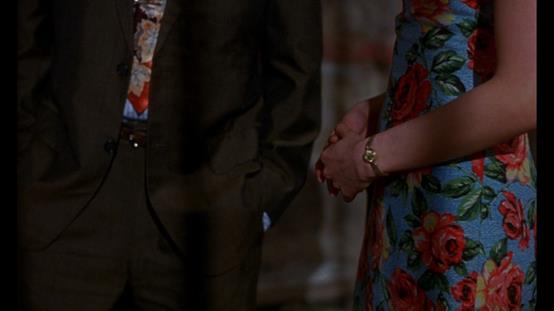
Figure 3: Zhang Manyu in a cheongsam. She is not only beautiful and fashion, but also cautious and always follows the rules. All her moves abide by the ladies’ guidelines. The cheongsam close to her is like a ruler, which reminds her not to behave uncomfortable
In "The hand", when Miss Hua was out of shape and Xiao Zhang wanted to change her dress, Miss Hua refused to say "just make it the original size and I will put it on". After she was seriously ill and moved to a lower class because of financial constraints, Zhang sat in front of her bed and told miss Hua that he had changed her clothes. Miss Hua said no more. The two refusals, the first one against the male rule, and the second one against a certain level, finally freed her from the heavy shackles and faced her true self.
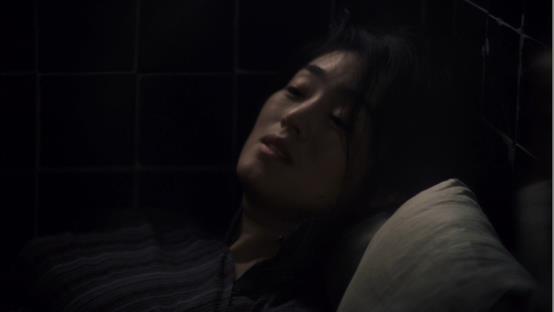
Figure 4: Miss Hua is lying on her back with a tired face and the collar of the dark cheongsam is open
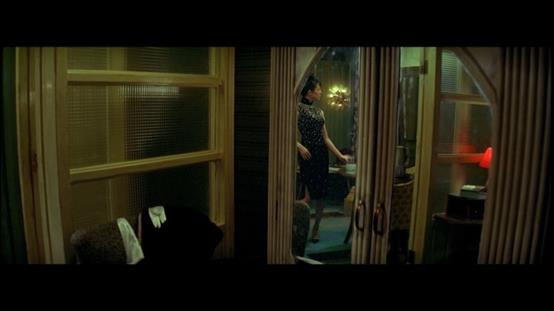
Figure 5: Bai Ling's coquettish and seductive figure, with a gorgeous black cheongsam, adorned with dazzling diamonds
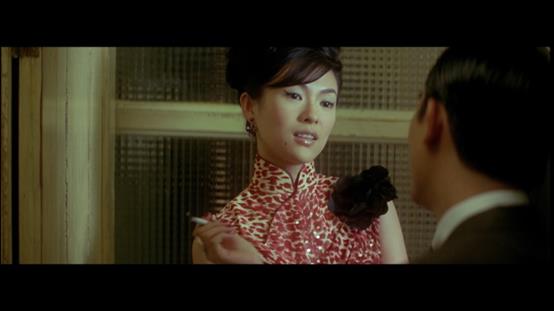
Figure 6: After a vague statement with Zhou Muyun, the design of the cheongsam is more gorgeous, with bright sequins and bold black flowers
In the first half of the film, Bai Ling’s cheongsam is bright and bold in color, warm yellow, green and bright red. All of them showed her hot and colorful. But in the eyes of Zhou Muyun, Bai Ling is only a substitute for wearing a cheongsam, just like all women wearing cheongsam. At the end of the film, with the awakening of Bai Ling, the cheongsam became the last plain and dim, which also coincides with the inner changes. Especially at the end of the plain cheongsam, from the color tone to the design is clean and prosperous, as shown in figure 7 below.
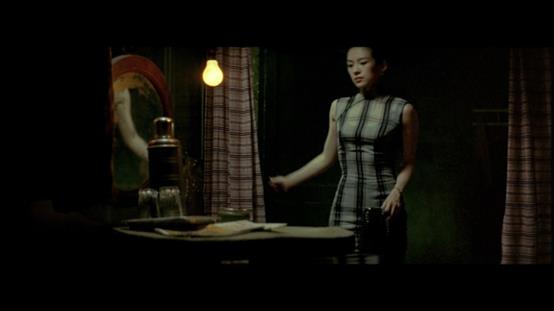
Figure 7: When they finally separated, Bai Ling wore a plain cheongsam without bright sequins, which implies that she has retreated previous pride.
Few cheongsams are white, and the only white is reflected in the mirror. Almost every space in 2046 is equipped with a mirror. The characters always stare at their own reflection when talking, laughing, or flirting, as if they were watching the behavior of others rather than their own. Lacan Jaques proposed that human cognition of image is based on the initial infatuation and forms an abstract mirror image through the separation of reality. The theme of reflection is a metaphor for the complex inner world of the characters. The mirror creates a special fuzzy visual effect. When Bai Ling appeared, she was dressed in a gorgeous black cheongsam and presented in a mirror, which was clear and bright. In sharp contrast to the blurred white color at this time, it shows the “white" spirit of Bai Ling from the side but is not taken seriously by others.
Just as Foucault said: "There is no need for weapons, physical violence or material prohibition. Only one gaze, namely, one watchful gaze-everyone will become humble under the weight of this gaze." [9]. "Gaze" has become the best tool to make women obey consciously in the male-dominated society. Women use various methods to achieve their "standard-compliant" image and body and shape the so-called "femininity". Such a male viewpoint rooted in the female self-concept has established a self-examination mechanism in their mind. Whether men are present or not, such a mechanism ensures that women are always in a position to be stared at. This has the same connotation as Beauvoir’s theory of gender composition.
4.Confrontation and Subversion
The women in Wong Kar-wai’s films are not without struggle.
4.1.Sex and Identity for Ten Dollars
After Zhou Muyun and Bai Ling had sex, Zhou turned to pay her. Bai Ling is not a prostitute who trades with her body. Although she was dissatisfied, her reason could not control her feelings. So she "found a place" for herself: "OK, I charge you ten dollars. Even if I sell it to you at a low price, I'll give it to you when you want it. " After a period of time, ten dollars has become a kind of tacit understanding, such a tacit understanding only belongs to Bai Ling and Zhou Muyun, so that ten dollars of sex took root in Bai Ling's heart, making her fall in love with Zhou Muyun. Women urgently need to acquire a sense of belonging in the relationship between the two sexes, which results in the love discourse being dominated by men. The appeal and attribution of women's emotional psychology are completely determined by men.
Bai Ling's sorrow lies in her background color. From the very beginning, she was determined as that kind of women by Zhou. She was indecent, unrestrained and vulgar. Even if she posed high, she was also hypocritical and sincere. She was also regarded as a means for social butterfly to hang a man. Bai Ling is eager to have further relationship with Zhou, and Zhou Muyun refused to promise. She started from flirting with and ignoring the male protagonist before, and ended up dead-set with no face, and finally she resisted. When she hit Zhou with ten dollars, she said, "Take these ten dollars and I'll fuck you tonight!" At this time, Bai Ling has the general characteristics of a male, and even reveals that it is more vigorous than a male. This is the first confrontation from Bai Ling. Her second confrontation was to bring the man back in anger and deliberately let Zhou Muyun hear the sound. "I deliberately, you can take a woman, why can't I take a man?" However, Zhou Muyun immediately found a real prostitute and even dressed the same as Bai Ling, giving Bai Ling the definition of a prostitute and further strengthening sexual oppression. Bai Ling "indecently" resisted the restrictions and got more repression. From Simone De Beauvoir’s point of view in The Second Sex, women's psychological growth and changes continue to be constrained by male authority.
In 2046, the instinctive sexual impulse was quantified into ten dollars, which led to the confrontation of Bai Ling and even the subversion of gender consciousness, and the subordinate identity of women began to change. The predicament originally arising from the identity of "the other" and "the object" of women developed into a brand-new female face that fought against the traditional and independent self.
4.2. Aphasia Female Robot Wandering in Fantasy Space-time
Toni Morrison said: "Only by balancing male power with female power can a complete person be born." [10] This imbalance is reflected in the functional settings for robot women in 2046. On the train, the male passengers' coming and going are decided by themselves, while the female robot as a waiter is restricted by the oppression of space and is tightly confined in the train of life for life. On the surface, this is an illusion of the future, but it is a metaphor of the high abstraction of gender inequality in the past, present and future. Mechanical walking indicates that gender roles should be followed, and the functional settings of services represent the subordinate nature of women.
The robot's setting was cold, but Kimura felt her temperature when she hugged her. "I think this robot is very similar to her. I began to look for the answer on her." So, he kept repeating to the robot: follow me! The beautiful and slow robot has the appearance of a perfect woman and never responds. The silence here can also be regarded as the robot refusing to become a "substitute". "The conductor:" I found a problem. After a long journey, there will be a recession. It means that when they want to laugh, it will take several hours to laugh and when they want to cry, but their tears will not flow until tomorrow. " The female robot failed to respond and tried to "strike". Kimura starts to repeat that sentence again. When the female robot played by Faye Wong learns that Kimura is not only saying "follow me" to herself, she goes away frustrated. At the moment of looking back, a tear from her big eyes slips down the tip of her nose, which shows that she does not answer, not because she is dull, but because she is a kind of silent resistance. Her tears are her emotional resistance, but as a robot, her service nature cannot be changed, and she still continues to serve Kimura. Back at the beginning of the movie, the female robot speaks to the tree hole, highlighting the existence of the female robot as a separate individual. Women can not only be victims of gender discrimination, but also potential opponents of oppressive social norms.
4.3.Su Lizhen, the "Black Spider" who Refused to be controlled
When Zhou Muyun asked "Black Spider" Su Lizhen to go to Hong Kong with him, she refused him and said, "You don't know my past". Before leaving, Zhou said, "If one day you put down the past, remember to come back to me." [11] Black spider is not indulging in the past, this sentence is essentially said to yourself. When a man tries to "take away a woman", this is a common plot in love stories. De Beauvoir argued that men define women not as free agents but according to their relationship with men [3]. Women are not perceived as independent as she is only what the man decides she is. The black spider reminds him that her life is beyond his knowledge and beyond his control. She knew that knowing Zhou was only trying to find the former Su Lizhen from her, denying her autonomy and authority, and treating her as a "other". Therefore, she is willing to throw herself into a controllable gambling game, as a "subject" with a story and a past and a self exists independently and refuses to exist as a shadow “object".
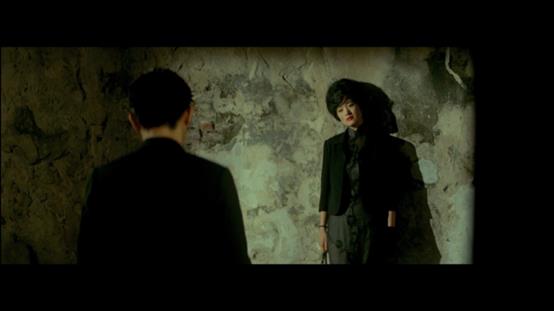
Figure 8: The composition here is particularly brilliant. The space between Zhou and Su gives people a sense of alienation. On the side of the black spider is a black shadow, which forms a frame composition and casts a "shadow" on the wall. From Zhou's perspective, "Black Spider" Su Lizhen is a shadow. It also strengthens the male perspective and ignores the female subjectivity.
5.Destiny that Can't Be Escaped
The male and female roles in Wong Kar-wai’s movies always have a fixed identity. The male roles in the movies are more unified than the female roles, which reflects Wong Kar-wai’s subjective identity and projection on gender consciousness. Their male roles are generally writer and policeman. In terms of female roles, their professional identities are often social butterfly, dancing girl or gambler. It is this unequal setting of identity symbols that makes the relationship between them unbalanced in the beginning. No matter the emotion occurs in any kind of characters, the interesting thing is that the characters in the female characters are also on the edge. Even under the reversal of desire and power, one cannot escape the fate depicted by love.
5.1.Women's Rejection and Desire
The women in Wong Kar-wai’s novels are all longing for love while refusing love. The relation between men and women can be said to be a right struggle with the mask of love mutually. Zhou Muyun followed the gambler "Black Spider" through the casino. She approached him and tried to save him. When Zhou asked about her past, "Let's compare sizes. If you win, I'll tell you." When Zhou Muyun invited her to go, "If you win, I will go with you." The love between two people is like a game, and Black Spider is a professional gambler. In fact, the outcome is entirely in her hands. She intended to lose to him, and he let her "win" twice. What looks like a refusal is actually a deep longing for love. When parting for the last time, the "Black Spider" opened its arms: "Come and hold me." The Black Spider wiped off the breath of her lips, and the makeup she had spent seemed more like a future she craved for stability but failed to achieve.
Bai Ling is intelligent and strong, but full of tragic atmosphere. Perhaps it is just a kind of hopelessness, even with a kind of revenge and self-indulgence. She is with Dabao again, a man whom she angrily drove away because of his betrayal. Under the circulation of these roles, it is the deep despair of women to men in their hearts. Beauvoir said ‘‘For woman, love is a supreme effort to survive by accepting the dependence to which she is condemned. [12] Wong Kar-wai used the gender discourse power that men always hold to send Bai Ling to Singapore as a dancing girl, which made her fall into prostitution. She felt inferior to her social status in her heart. She set a price of ten yuan, which she tried to protect her dignity. He said he would compensate her for the skirt, but she thought he had paid the sleeping bill on his own initiative. The emotional appeal of equality is deliberately controlled in the shaping of roles. Therefore, Wong Kar-wai magnified the equal right of men and women to perceive love, and also shaped the limitations of traditional women.
5.2.Reversion of Desire and Power
As discussed above, under the gaze of men, women cannot escape from the web of fate. Its essence is due to the imbalance between women's status and men's status. In The hand, even though the sexual status of men and women is reversed at first and women are in the top position, the final ending of the movie will still be reversed again.
As a social butterfly, Miss Hua's body is always the object of desire. Only in front of the little tailor, Miss Hua, whose inertia is the server, turned into a customer, and Xiao Zhang, who is the server, turned back her desire for power. Miss Hua first saw the scene in which Xiao Zhang told him to take off his pants, just after the guest Mr. Zhao stepped out of the room. This arrangement was exactly the handover of Miss Hua from a server to a customer. Xiao Zhang obediently stood in front of Miss Hua and let her hand wander freely on her body. This involves the reversal of roles and gender. She can be the subject of desire. "Take off your pants." This arrogant and frivolous command tone is full of sexual teasing and extremely offensive. When the actors speak their lines, they are treated as firm and indifferent, in sharp contrast to the obscene content of the lines. This kind of desire is beyond sex and represents her control over men in some way.
Even with such a power reversal relationship, women are still a sad ending. The touching scene between the two was especially classic, and Miss Hua's hand was caressed by Xiao Zhang. The difference is that this is different from the initial bossing and playing, but full of love and gratitude. Xiao Zhang is not as wooden as he used to be, and his hands are caressed warmly and tenderly by adult men. On her deathbed, Miss Hua held out her hand again and again, but her other hand could not keep Xiao Zhang's mouth open.
On the contrary, the other female characters in these two films are also the oppressed of power. The difference is that Xiao Zhang, as a male, finally regained his freedom and became an excellent and mature tailor, while the female suffered from this. In Wong Kar-wai’s films, the setting of Miss Hua is similar to the male role represented by Zhou Muyun. However, Zhou Muyun was able to get away with it, while Miss Hua was mercilessly sentenced to "death" by the director. Under the same level of power, the outcomes of men and women show great contrast. From a deeper level, such an outcome reflects that the difference in outcome is due to the essential difference brought by gender under the situation of the same identity and role.
In "2046", “The hand" and "In the Mood for Love", Wong Kar-wai portrays many female characters full of oriental charm. "It should be noted that this recognition of women's secondary sexual identity and status is done under the eyes of men"[13]. Women are seen and recognized in the name of love, which further excavates the foundation of gender oppression. In other words, the premise of this promise in the name of love itself lies in the weak status of women and the second sex of women! So, "Wong Kar-wai’s movies are a male gaze with mixed female eyes.” [14].
6.Conclusions and practical implications
Based on the films "2046" and "The hand" as the texts, this paper combs the three levels of women's awakening, confrontation and fate. Based on discourse, body and characterization, this paper presents the image structure of indecent women. In the depiction of tradition and subversion, it also provides rich cases for feminist studies in the images. Wong Kar-wai’s films have both traditional gender awareness and modern women's stand. Shaping women from a male perspective, expressing women's thoughts and feelings from a male standpoint. However, the portrayal of women's self in the film is understated. "It may really be said that although women as a landscape have received a lot of emphasis in the film, to a large extent women are still absent as women." [15].
The unique Wong Kar-wai portrays the female image delicately and intriguingly. Every female image can give us a metaphorical beauty. The female image is fully demonstrated in Wong Kar-wai’s films. It has not only the gentle temperament of the lost oriental female character, but also the unique strong personality style of modern women. He pushed all kinds of contradictions in women to a climax and integrated the traditional and modern flavor into women's characteristics. From this perspective, Wong Kar-wai’s films have achieved the combination of postmodernism and feminism. Because of Wong Kar-wai's definition of love is time-bound and tragic, women's love roles in the movies are stubborn and lonely. From the group level, Wong Kar-wai's portrayal of women's characters enlarges the social space's control and repression of women. Although women in this stage still did not get rid of the inherent control form of the times and society, they still existed as executors under the male discourse. However, the women in the movies are trying to get rid of the shackles of tradition and bravely pursue their own happiness. Although they cannot completely get rid of the traditional perspective, they have achieved a certain degree of identity breakthrough.
The thesis provides a feminist analysis perspective from different perspectives. As a film creator of "the second generation of new wave", Wong Kar-wai is in the historical period of 1997. With his unique feelings towards the 1960s, Wong Kar-wai has formed a cultural search for "rootless". Through the analysis of the indecent images of women in Wong Kar-wai’s films, the paper clarifies the motif and way of constructing the female images.
References
[1]. Simon Beauvoir, trans. Tao tiezhu: The Second Sex [m]. Beijing: China book publishing house, 2004:245L
[2]. Zhu Xiaolan, "Staring" Theory Research [D]. Nanjing University, 2018.
[3]. De Beauvoir, S. (1949/2012). Det andra könet [The Second Sex]. Gallimard.
[4]. Foucault and Routledge Classics 1972; Allen 2008
[5]. Foucault, M. (1978). The history of sexuality: Vol. 1, an introduction. New York: Vintage Books. Gill, R. (2007). Gender and the media. Cambridge: Polity Press.
[6]. Booker, M. K. (1996). A Practical Introduction to Literary Theory and Criticism. New York: Longman Publishers USA.
[7]. Foucault, M. (1978). The History of Sexuality:Volume 1: An Introduction. (R. Hurley, Trans.). New York: Pantheon Books.
[8]. Millet, ed.: "Wong Kar-wai in the Mood for Love", Modern Publishing House, 1st Edition, 2001.
[9]. Foucault’s "discipline and punishment"; The Birth of Prisons [M] Shanghai; Sanlian Bookstore, 2003; 227.
[10]. (Law) simone de Beauvoir. Second Sex 2[M]. Trans. Shu Xiaofei. Beijing: Xiyuan Publishing House, 2004: 243-245
[11]. Taylor guthrie: An Interview with Toni Morrison, p. 107.
[12]. It is noteworthy that a discussion of servility and dependence emerges early in Beauvoir’s work, and finds considerable expression in The Ethics of Ambiguity ( Beauvoir 1962, 37). Hereafter cited as TEOA.
[13]. (Li Daoxin's "Wong Kar-wai’s Spiritual Trend and Its Cultural Meaning", "Contemporary Films", No.3, 2001).
[14]. Li Daoxin, New Visual Criticism, Peking University Press, April 2002, 1st Edition, p. 323.
[15]. Clare, Johnston: "Woman's Film as Counter-cinema, 1973"
Cite this article
Lyu,J. (2023). “Indecent” Female Images in Wong Kar-wai’s Films. Communications in Humanities Research,2,294-305.
Data availability
The datasets used and/or analyzed during the current study will be available from the authors upon reasonable request.
Disclaimer/Publisher's Note
The statements, opinions and data contained in all publications are solely those of the individual author(s) and contributor(s) and not of EWA Publishing and/or the editor(s). EWA Publishing and/or the editor(s) disclaim responsibility for any injury to people or property resulting from any ideas, methods, instructions or products referred to in the content.
About volume
Volume title: Proceedings of the 3rd International Conference on Educational Innovation and Philosophical Inquiries (ICEIPI 2022), Part III
© 2024 by the author(s). Licensee EWA Publishing, Oxford, UK. This article is an open access article distributed under the terms and
conditions of the Creative Commons Attribution (CC BY) license. Authors who
publish this series agree to the following terms:
1. Authors retain copyright and grant the series right of first publication with the work simultaneously licensed under a Creative Commons
Attribution License that allows others to share the work with an acknowledgment of the work's authorship and initial publication in this
series.
2. Authors are able to enter into separate, additional contractual arrangements for the non-exclusive distribution of the series's published
version of the work (e.g., post it to an institutional repository or publish it in a book), with an acknowledgment of its initial
publication in this series.
3. Authors are permitted and encouraged to post their work online (e.g., in institutional repositories or on their website) prior to and
during the submission process, as it can lead to productive exchanges, as well as earlier and greater citation of published work (See
Open access policy for details).
References
[1]. Simon Beauvoir, trans. Tao tiezhu: The Second Sex [m]. Beijing: China book publishing house, 2004:245L
[2]. Zhu Xiaolan, "Staring" Theory Research [D]. Nanjing University, 2018.
[3]. De Beauvoir, S. (1949/2012). Det andra könet [The Second Sex]. Gallimard.
[4]. Foucault and Routledge Classics 1972; Allen 2008
[5]. Foucault, M. (1978). The history of sexuality: Vol. 1, an introduction. New York: Vintage Books. Gill, R. (2007). Gender and the media. Cambridge: Polity Press.
[6]. Booker, M. K. (1996). A Practical Introduction to Literary Theory and Criticism. New York: Longman Publishers USA.
[7]. Foucault, M. (1978). The History of Sexuality:Volume 1: An Introduction. (R. Hurley, Trans.). New York: Pantheon Books.
[8]. Millet, ed.: "Wong Kar-wai in the Mood for Love", Modern Publishing House, 1st Edition, 2001.
[9]. Foucault’s "discipline and punishment"; The Birth of Prisons [M] Shanghai; Sanlian Bookstore, 2003; 227.
[10]. (Law) simone de Beauvoir. Second Sex 2[M]. Trans. Shu Xiaofei. Beijing: Xiyuan Publishing House, 2004: 243-245
[11]. Taylor guthrie: An Interview with Toni Morrison, p. 107.
[12]. It is noteworthy that a discussion of servility and dependence emerges early in Beauvoir’s work, and finds considerable expression in The Ethics of Ambiguity ( Beauvoir 1962, 37). Hereafter cited as TEOA.
[13]. (Li Daoxin's "Wong Kar-wai’s Spiritual Trend and Its Cultural Meaning", "Contemporary Films", No.3, 2001).
[14]. Li Daoxin, New Visual Criticism, Peking University Press, April 2002, 1st Edition, p. 323.
[15]. Clare, Johnston: "Woman's Film as Counter-cinema, 1973"









